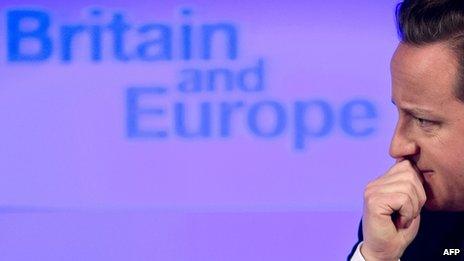European media question Cameron's EU plan
- Published

French and German media have denounced British Prime Minister David Cameron's pledge to hold an in/out referendum on EU membership as a "risky game" motivated by domestic political considerations.
There are fears that Mr Cameron may not be able to control a process which could lead to Britain leaving the EU. This is mostly seen as an unwelcome prospect.
Instant reactions posted by European pundits on Twitter and Facebook were also marked by scepticism.
Germany
German newspapers have been quick to post prominent commentaries on Cameron's speech on their websites.
Michael Koenig in the Sueddeutsche Zeitung says the plan for a referendum "sounds quite simple, but when you look at it more closely it turns out to be a highly risky game in which all sides could lose out".
Mr Cameron's speech can be interpreted as "an early election pledge", he adds, but if a new EU treaty never materialises or the British vote against it, then Britain will face "huge losses politically but above all economically".
Klaus-Dieter Frankenberger in the Frankfurter Allgemeine Zeitung warns that "Britain's conduct is quite simply getting on the nerves" of its EU partners. The outcome of a referendum could be that "the British patient will be cured" or that it will "doze away in a state of isolation of its own choosing". The latter possibility would be "a nightmare for everybody".
Dietrich Alexander in Die Welt is adamant that "European states will not accept a special role for Britain" in the bloc but is reassured by the fact that there is still a lot of time left "for Cameron to see reason". "There can be no Europe 'a la carte'," and, although the EU needs to change, it "cannot allow itself to be blackmailed", he insists.
"Does Cameron want to destroy Europe?" the best-selling paper Bild asks in a top headline on its website. "Cameron is playing with fire... Europhobic Tories are now in control of the party. The aggressive, anti-European tabloid press is exerting additional pressure," it says.
But Bettina Vestring in the Berliner Zeitung says the referendum decision "could bring Cameron great political benefits... his party will be able to make gains among the growing crowd of anti-Europeans in the next parliamentary election. That will in turn give Cameron weight in negotiations with his EU partners, who will try to meet at least some of the British demands in order to keep Britain in the Community."
France
Mr Cameron's speech has been less prominently reported or commented on by French newspaper websites.
The London correspondent of the daily Le Monde, Marc Roche, judges that "on the face of it, David Cameron has reassured his Europhobic right, who got what they wanted". While the prime minister also "endeavoured to hold out his hand to his European partners", he remained "vague" on what will happen if France and Germany deny him any new opt-outs.
Anissa el Jabri agrees on the website of the weekly Le Point that "David Cameron will have his work cut out with his European partners".
France 2 TV's Brussels correspondent, Francois Beaudonnet, raises a different concern on the France TV Info website. "Catherine Ashton, the EU's British high representative for foreign affairs and security policy, is supposed to be Europe's voice in the world. Her position is going to be very uncomfortable since she is British," he says.
Mr Beaudonnet also warns that Britain's exit from the EU "would have major economic and military consequences" and would constitute a "very heavy blow to European construction".
Social media
European journalists and pundits have posted comments ranging from sceptical to scathing on Twitter and Facebook.
Jean Quatremer, the EU correspondent for French daily Liberation, who has 40,155 followers on Twitter, tweeted in French: "Once again the [European] Commission wins the top prize for waffling by saying it is pleased that Cameron is in favour of staying in the EU".
Thomas Mayer, the Europe editor at the Austrian daily Der Standard, tweeted in English: "problem is Europeans no longer listen to #cameron, talking like extremist from the right".
In a German-language tweet, Mr Mayer told his 1,984 followers: "after #Cameron speech and #elysee celebrations it is clear that Europe needs German-French axis more than ever, UK cannot be relied upon, Tories have drifted off".
Dutch journalist Stefan de Vries, who has 4,367 followers, tweeted in English: "Cameron wants referendum on #Brexit. Let's organize a European referendum the same day on UK's place in Europe." He added that if Britain votes to stay in, it should "stop whining forever".
Hans Kundnani, the editorial director at the European Council on Foreign Relations think tank, who has 533 followers, tweeted in English: "The most important thing in #thespeech: Cameron's rejection of the fundamental idea of 'ever closer union'."
Writing on Facebook, Paul Schmidt, the director of the Austrian Society for European Policy, said in German that "it is questionable whether Cameron can really strengthen his own negotiating position in the EU" by announcing his referendum plan. He added: "In any event, Cameron's bid to win the 2015 election with the EU as a scapegoat is a risky game. This strategic step does not inspire confidence in Britain's future political and economic stability."
BBC Monitoring reports and analyses news from TV, radio, web and print media around the world. For more reports from BBC Monitoring, click here. You can follow BBC Monitoring on Twitter and Facebook.
- Published23 January 2013
- Published20 January 2013
- Published23 January 2013
- Published18 January 2013